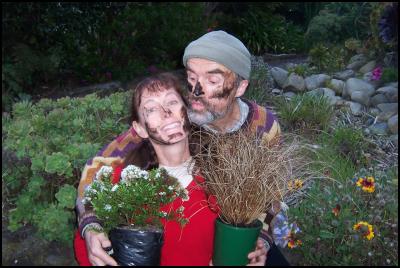Fancy a dirty weekend in your own back yard?
5 October 2007
Fancy a dirty
weekend in your own back yard?

Weed
swaps: Waitangi Park, Wellington, Saturday 13 October, 10am
– 2pm
Kapiti Uniting Parish, Raumati, Sunday 14
October 2pm – 5pm
Residents of Wellington and the Kapiti Coast are encouraged to have a Dirty weekend in their own back yard.
After a session clearing environmentally-damaging weeds from their garden, they will be rewarded with a replacement native plant at weed swaps at Wellington’s Waitangi Park from 10am to 2pm on October 13, and the Kapiti Uniting Parish at Raumati from 2pm to 5pm on October 14.
They are part of a national Weedbusters initiative to promote environmentally-friendly gardening by urging people to replace garden weeds with natives and so improve our natural environment, not just for people but also for our native insects, lizards and birds.
“We want people to have a dirty weekend by climbing into their back gardens and ripping out those invasive exotic plants that have become serious pests in our parks and reserve, says DOC botanist John Sawyer.
The Department of Conservation is hosting both events in conjunction with Wellington City and Greater Wellington Regional Councils, and with the Raumati Sustainability Expo on the Kapiti Coast.
These events are targeting, in particular, the most invasive and nastiest garden weeds including wandering willie, climbing asparagus, evergreen buckthorn, mistflower and cathedral bells.
They can be swapped for a wide range of eco-sourced indigenous alternatives such as toetoe, pigeon wood, wineberry, lemonwood and flax. More than 1000 native plants will be available at the weed swaps.
John Sawyer says using plants native to the region can help buffer existing reserves and create habitats and food sources for native animals. Native berries attract native birds and lizards, and densely-tangled plants provide shelter for lizards and invertebrates. Spring gardening is also a great way to get fit for summer.
More than 300 exotic plants are considered serious weeds in New Zealand and 75 percent of them originated as garden escapes or have been dumped in parks and waterways, says John Sawyer.
“Garden weeds have the potential to replace native species in the wild. This jeopardises our indigenous wildlife and has a detrimental impact on our recreational opportunities.”
Thousands of native plants have been handed out at weed swaps in the Wellington region over the last three years.
“Because of the fantastic public response to past weed swaps we’ve decided to organise more, helping gardeners do the right thing by killing their weeds, thereby helping us protect our local parks and reserves.”
To avoid mistaken identification, photographs of weeds growing in Wellington can be found in the multi-agency book Plant me instead – a guide to environmentally-friendly gardening (available from garden centres and bookshops) or visit the following websites:
Weedbusters: www.weedbusters.org.nz
Greater
Wellington Regional Council: www.gw.govt.nz
New Zealand
Plant Conservation Network:
www.nzpcn.org.nz
ENDS


 Master Plumbers Gasfitters and Drainlayers NZ: New Consumer NZ Test Reveals Danger Of Unregulated Online Plumbing Products
Master Plumbers Gasfitters and Drainlayers NZ: New Consumer NZ Test Reveals Danger Of Unregulated Online Plumbing Products Mindful Money: Winners At The Mindful Money Annual Ethical & Impact Investment Awards 2025
Mindful Money: Winners At The Mindful Money Annual Ethical & Impact Investment Awards 2025 MBIE: Gas Supply Reducing Faster And Sooner Than Previously Forecast
MBIE: Gas Supply Reducing Faster And Sooner Than Previously Forecast Natural Hazards Commission: International Markets Show Unprecedented Confidence In NZ’s Natural Hazards Insurance Scheme
Natural Hazards Commission: International Markets Show Unprecedented Confidence In NZ’s Natural Hazards Insurance Scheme  ASB Bank: ASB Business Survey - The Impact Of Trump's Tariffs, According To Kiwi Businesses
ASB Bank: ASB Business Survey - The Impact Of Trump's Tariffs, According To Kiwi Businesses University of Auckland: Will Robots Help Older People Stay Sharp?
University of Auckland: Will Robots Help Older People Stay Sharp?


